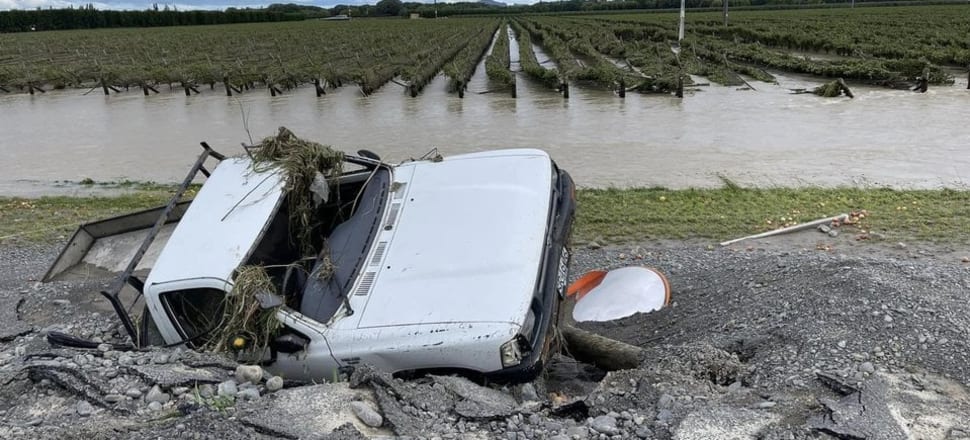
Orchardists are picking up the pieces from Gabrielle and keen on all the support they can get
The proposition of an immediate grant from the Government to save the apple trees in his Hawkes Bay orchard has been well received by Brydon Nisbet, the president of the local fruitgrowers’ association.
One of Nisbet’s smaller orchards was lost when a stop bank failed, but he is working to save his bigger five-hectare location.
He expects to get $2000 in funding per hectare to save his fruit trees, painstaking work that requires removing silt from the site to let roots breath.
“I’m just getting on with it. It’s going to cost me a huge amount, I’d hate to even think. I’ve got heaps of diggers and all sorts here, my first day was probably $12,000 or $15,000 and that’s straight off the cuff for the amount of people I’ve got here.”
If the trees aren’t dealt with quickly enough they will die and it will be years before Nisbet will have fruit to sell.
“It's gonna cost me heaps,” Nisbet said with a slight chuckle, “but it’s that or I lose my whole orchard”.
READ MORE:
*The Waikato town forgotten in the storm
*Parker’s office says slash an issue for Nash
*Cawthron boss told he should have expressed himself better
He anticipates further government support to help clean up access routes and other infrastructure on the orchard.
“This is the first package, or at least it's a help, at least it's something I can get in and claw back and get some money in my account because in the end I can't get insurance for this.”
Nisbet isn’t alone in not having crop insurance and doesn’t know of anyone who expects cover for their fruit in this instance – many don’t even think it’s an option beyond hail damage.
No cover
Even large NZX-listed apple grower Scales Corporation didn’t have insurance to cover flooding from Cyclone Gabrielle.
Scales managing director Andy Borland said the business didn’t have crop insurance in place this year because a past claim from its insurer, one he thought was a cut and shut case, was being disputed.
The business made the decision to forgo the insurance which cost the business something like $1m a year.
He said the product had become increasingly niche in the past few years.
“The industry used to just get standard crop insurance from the New Zealand-based insurers, but that product was withdrawn progressively because there's just been too many claims I guess.”
Hawkes Bay is one of New Zealand’s most important fruit-producing regions, with 6186 hectares of apple orchards out of a total 9789 hectares in New Zealand. Scales is responsible for 1100 in Hawkes Bay alone.
"Not uncommon"
A spokesperson for the Insurance Council said crop insurance was “not uncommon”, but there were capacity limits for reinsurance of the product because of limited appetites for reinsurers (the businesses that insure the insurers) to take on the product, meaning there was only a set number of policies that could be sold each year.
The main writer of crop insurance and rural insurance in New Zealand is FMG.
Across all policies, it has approximately 2150 claims related to Cyclone Gabrielle.
FMG area manager Hayden Dunne said its orchard fruit policy covered grapes, pip and stone fruit from flood, hail, fire, and other damages.
It insures around 150 orchard businesses, with half of those in Hawkes Bay.
Using the same “not uncommon” phrase as the insurance council, Dunne said there were limits to how much could be insured.
As far as confusion about what was and wasn’t covered by its orchard policy, he urged anyone who was unsure about what was covered to get in touch.
Front footing it
With or without insurance, Nisbet is going to keep his business alive no matter what.
“In the end, we just have to front foot it, if we want to fix up the orchards or whatever, it's at our cost and we have to do it and that's why however and whenever government funding comes is just going be fantastic.”
Outside of just government grants, Nisbet said support had been wide-reaching.
“The banks are coming out and offering three months interest-free loans and they are about connecting with the growers and connecting with the farmers. They are coming to help because they know that we're going to need help.”
He said he’d also had locals show up with shovels ready to get stuck in and the marae down the road was cooking food to bring to the workers in the afternoon. “Everyone’s just jumping in together.”







